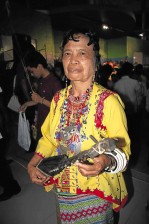Mansaka musicians play in Manila
TAGUM CITY, Philippines—Bia Carmen Onlos, an elderly woman who belongs to a Mansaka tribe of Compostela Valley province, remained ecstatic shortly after she and the other musicians performed before local and foreign spectators at the newly built multimillion-peso City of Hall of Tagum in Davao del Norte.
She was chosen to play with 300 musicians with string instruments, including those from more than a dozen countries, during the weeklong 3rd Cuerdas ng Pagkakaisa (String of Unity) International Festival held in February.

BIA CARMEN Onlos, of the Mansaka tribe in Davao del Norte province, said she won’t forget the experience of joining a musical ensemble composed of some 300 musical artists from several countries who performed during the 3rd International Rondalla Festival. DENNIS JAY SANTOS/INQUIRER MINDANAO
“I am so happy,” said Bia Carmen, clutching her two-string native lute called “pako.” Never did she dream that she would be on stage performing with known artists from across the world, united in the harmony produced by their instruments.
Teaching offer
Not even her younger brother, Datu Rudy Kimod Onlos, who also plays the “kudlong,” could imagine that they be applauded for every piece they played.
The artists played their finale under the baton of Dr. Ramon Santos, project director and president of the Musicological Society of the Philippines. For Bia Carmen, the applause was something that she did not get from her remote village.
The two siblings’ excitement wasn’t short-lived. They were invited by Santos to teach music at the University of the Philippines in Diliman, Quezon City, and perform at different gatherings and before several government officials.
In the five days she spent in Manila, Bia Carmen stayed in hotels just like pop divas do in out-of-town concerts. It was also her first time to ride on an airplane.
“It was tiring for her because she is already old, but she really enjoyed it,” Datu Rudy said of his sister. “And she would tell me, ‘So this is the life of the rich people.’”
Cultural heritage
“This a great contribution in the efforts of preserving the rich cultural heritage,” Datu Rudy said.
It is also the essence of the Indigenous Peoples Rights Act that ensures the promotion and preservation of ethnic culture and tradition, he said.
When Bia Carmen returned to their village and told them about whole experience, the youngsters started to show interest in learning their ancient musical instrument. “If you want to go places, then learn the instrument,” Bia Carmen would tell them.
Datu Rudy said he was happy that their traditions would not just die.
The Rondalla Festival, held every three years, aimed to “promote global peace and understanding” through plucked strings. Participating countries included Russia, China, Singapore, Thailand, Mexico, Iran, India, Indonesia and Taiwan, and delegates from the Unesco International Music council.